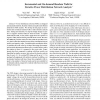2084 search results - page 76 / 417 » Proving Time Bounds for Randomized Distributed Algorithms |
120
click to vote
ASPDAC
2009
ACM
15 years 9 months ago
2009
ACM
— Power distribution networks (PDNs) are designed and analyzed iteratively. Random walk is among the most efficient methods for PDN analysis. We develop in this paper an increme...
132
click to vote
OPODIS
2007
15 years 3 months ago
2007
Abstract. In small-world networks, each peer is connected to its closest neighbors in the network topology, as well as to additional long-range contact(s), also called shortcut(s)....
121
click to vote
ICS
2010
Tsinghua U.
15 years 6 months ago
2010
Tsinghua U.
Quantum k-SAT is the problem of deciding whether there is a n-qubit state which is perpendicular to a set of vectors, each of which lies in the Hilbert space of k qubits. Equivale...
120
click to vote
PARELEC
2002
IEEE
15 years 7 months ago
2002
IEEE
In this paper, we investigate the worst case performance of Earliest Due Date algorithm when applied to packet scheduling in distributed systems. We assume that the processing ele...
CRYPTO
2005
Springer
15 years 8 months ago
2005
Springer
We investigate methods for providing easy-to-check proofs of computational effort. Originally intended for discouraging spam, the concept has wide applicability as a method for co...

